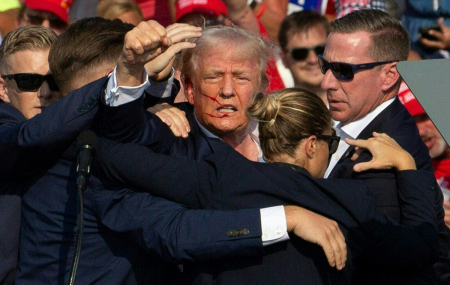One-third of Democrats wish Trump's assassin didn't miss, poll suggests

About one-third of Democrats say they wish the assassin's bullet directed at former President Donald Trump earlier this month did not miss, a new poll suggests, a potential reflection of the volatile political climate engulfing the United States.
A snap July 18 survey of 235 Democrats conducted by University of Buckingham Professor Eric Kaufman examined whether people agreed with a statement declaring that "I wish Trump's assassin didn't miss."
The survey was commissioned five days after Trump narrowly escaped death as an assassin's bullet grazed his ear at a July 13 rally in Pennsylvania but did not kill him. However, one attendee was killed and two others were injured.
Kaufman, a politics professor, stated that based on his research, "a third of Democrats support the attempt on Donald Trump's life." He expressed gratitude that the remaining two-thirds of Democrats in the sample did not support it.
"This raises the question of which kind of Democrat backed the killing of Trump," Kaufman wrote. "Support for the statement hardly varies by age, race or education, but is connected to ideology and partisanship."
The data suggests a relationship between support for the assassination attempt and a belief that white Republicans are racist.
Data included in a summary of Kaufman's findings published by Unherd show that overall, 55% of Democrat voters agreed with a statement proclaiming "white Republicans are racist," while 20% disagreed.
Among those who "strongly agree" that white Republicans are racist, 71% expressed support for Trump's assassination. Thirty-four percent of respondents who "slightly agree" that white Republicans are racist came out in favor of the former president's assassination.
Much smaller shares of voters who indicated that they neither agreed nor disagreed that white Republicans are racist (15%) and those who "slightly disagree" with that opinion (11%) wished that the assassination attempt had succeeded. The idea of assassinating Trump did not register with respondents who "strongly disagree" with the view that white Republicans are racist.
"For my new book The Third Awokening (published in the UK as Taboo), I conducted nationally representative surveys in 2020 which showed that two in three white liberals agreed with the 'White Republicans are racist' statement," Kaufman wrote.
"Those who did were twice as likely as those who disagreed with it to say that 'people who disagree with me politically are immoral.' They were also nearly twice as likely to say that politics is important for their identity. In effect, woke beliefs make people moralise politics, increasing intolerance and totalising black-and-white thinking."
Kaufman wrote that the increasing "pattern of partisan asymmetry" is caused by the political left being "more prejudiced against" the political right than vice versa, a trend he says is evident in both the United Kingdom and the United States.
"Now, identity politics has moralised the outlook of the Left, painting conservatives as evil rather than wrong," Kaufman wrote. "This fuels catastrophising language around 'white supremacy,' 'fascism' and 'danger,' leading to a high-stakes emotional atmosphere. Given our new politics of identitarian sacredness and moral absolutism, we should not be surprised to see a rise in political extremism."
The assassination attempt against Trump, the Republican Party's nominee for president of the United States, has heightened concerns about the impact of volatile political rhetoric.
In an address from the Oval Office the day after the assassination attempt, President Joe Biden urged the American people to "lower the temperature in our politics."
"There is no place in America [for] this kind of violence, for any violence, ever, period," he added. "The political rhetoric in this country has gotten very heated. It's time to cool it down."
Following the assassination attempt, Biden reflected on his own rhetoric and how it may have contributed to the current political climate. He clarified remarks he made during a phone call the week before the assassination attempt where he asserted that "it's time to put Trump in a bullseye."
In an interview with NBC's Lester Holt last week, Biden described his use of the term "bullseye" as a "mistake," stressing that "I meant focus on him" and "focus on what he's doing" as well as his policies and "lies he told in the debate."
Biden was expected to be Trump's Democratic rival in the 2024 presidential election but dropped out of the race earlier this week. Trump will likely face off against Vice President Kamala Harris, who has become the presumptive Democrat nominee after Biden exited the race and endorsed his vice president as his preferred successor.
Ryan Foley is a reporter for The Christian Post. He can be reached at: [email protected]





















